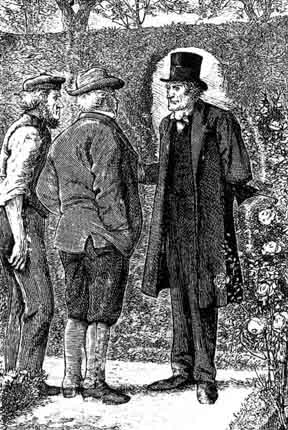 "Do you feel an uncomfortable heat at the pit of your stomach...and a nasty thumping at the top of your head?...I call it the detective-fever."
"Do you feel an uncomfortable heat at the pit of your stomach...and a nasty thumping at the top of your head?...I call it the detective-fever."- Gabriel Betteridge, The Moonstone
The Moonstone is certainly one of the first detective novels. As such, it both sets many of the standards that will be followed in the genre but at the same time it is a bit more fluid than the standard detective novel.
In The Moonstone many characters play detective in addition to Sergeant Cuff of the Detective Police.
Gabriel Betteridge, Lady’ Julia’s house steward, describes detective fever. He can’t resist asking the servants his own questions.
Mr. Bruff, the family lawyer turns detective both to discover who looked at Lady Verinder’s will, and setting a watch on the bank.
Ezra Jennings pieces together Doctor Candy’s fevered ravings and makes a sensible narrative of them.
Franklin Blake turns amateur detective assembling the evidence of all the other characters to piece together the story.
Sergeant Cuff however represents many of the traits that would become standard to the professional detective. The unassuming appearance, the eccentric behavior, the use of misdirection to elicit answers, would all become part of the trope of the detective.
In this stage adaptation of The Moonstone, we lose the local police Superintendent Seagrave of Frizinghall, who acts as the bumbling, pompous foil to the deductions of Sergeant Cuff, who comes from London. Cuff is a member of the detective-police, a newly established in London where a detective, who specialized in solving crimes would be in charge of cases as opposed to the usual police officers.
Betteridge describes Cuff, "He was dressed all in decent black, with a white cravat round his neck. His face was as sharp as a hatchet, and the skin of it was as yellow and dry and withered as an autumn leaf. His eyes, of a steely light grey, had a very disconcerting trick, when they encountered your eyes, of looking as if they expected something more from you than you were aware of yourself. His walk was soft; his voice was melancholy; his long lanky fingers were hooked like claws. He might have been a parson, or an undertaker--or anything else you like, except what he really was."
In fact, Sergeant Cuff is likely based on a real London police detective, Inspector Jonathan Whicher. The Suspicions of Mr. Whicher traces Whicher's rise, fall and and investigation of the shocking murder of a three-year-old child, Saville Kent. Whicher is pictured at left. Whicher came to suspect a half-sister, Constance Kent and was ridiculed in Punch and his career ruined. Later, Constance Kent confessed but it was too late to resuscitate his career or the shambles of his life.
The new role of the clever detective and the emerging science of deduction was of interest to Collins and his friend Charles Dickens, who wrote several short pieces in his weekly paper Household Words, "The Detective Police," "On Duty with Inspector Field" and and "Three Detective Anecdotes" in which he met, profiled and praised the new order of detectives.
Collins also establishes the Detective with an eccentricity. Cuff loves roses and wants to cultivate them when he retires. He is described whistling "The Last Rose of Summer" an Irish Air by Thomas Moore, that was further popularized as Mendelssohn used it as the source for a fantasia. The lyrics are below.
'Tis the last rose of summer, left blooming all alone
All her lovely companions are faded and gone.
No flower of he kindred, no rose bud is nigh
To reflect back her blushes and give sigh for sigh.
I'll not leave thee, thou lone one! to pine on the stem
Since the lovely are sleeping, go sleep thou with them
Thus kindly I scatter thy leaves o'er the bed
Where thy mates of the garden lie scentless and dead.
So soon may I follow, when friendships decay
And from love's shining circle the gems drop away
When true hearts lie wither'd and fond ones are flown
Oh! who would inhabit this bleak world alone!
The lyrics seems to have additional significance given the role the roses picked for Franklin Blake's button hole play for both Rosanna Spearman mental state and what Rachel Verinder will go through after the theft of the diamond. The decay in the song is not unlike the decay inherited with the moonstone that seems to be destroying and scattering the family unit.
It is also interesting to note that the reader, or, in our case, the audience is asked to participate in this detective-fever. We are given the various accounts related to the missing moonstone and asked to piece them together. In doing so, we are asked to peer into the lives and motivations of the characters and lift the veil of Victorian domestic life.


No comments:
Post a Comment